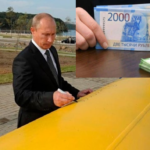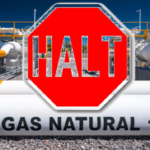Russia’s energy giant Gazprom says it has signed an agreement with China to start payments for gas supplies to China in yuan and rubles instead of US dollars.
The move is part Russia’s effort to reduce reliance on the US dollar, euro and other hard currencies in its banking system for trade as it grapples with Western sanctions in response to the invasion of Ukraine.
It is also a sign of warming relations between Beijing and Moscow.
“The new payment mechanism is a mutually beneficial, timely, reliable and practical solution,” Gazprom CEO Alexei Miller was quoted as saying in a statement following a video conference meeting with the head of China’s oil group CNPC, Dai Houliang.
Miller added that it will “simplify calculations” and “become an excellent example for other companies”
Miller informed his Chinese counterpart of the “status of work on the project for gas supplies via ‘the eastern route’ – the ‘Power of Siberia’ gas pipeline” which connects the Russian and Chinese gas networks, the Gazprom statement said.
- Read also: Russia set to receive $10 billion as dividend from Gazprom after record profits this year
- Russia’s economy hasn’t collapsed as predicted by Wall Street following Ukraine invasion
- Turkey and Russia sign MOU, to use Russian ruble as currency for trade
- EU eases sanctions on Russian Oil for the sake of “food and energy security”
Gazprom did not provide further details on the scheme or say when payments would switch from dollars to rubles and yuan.
Recently, Russia has been working on building closer economic ties with China and other non-Western countries.
Russian President Vladimir Putin earlier this year forced European customers to open ruble bank accounts with Gazprom bank and pay in Russian currency if they wanted to continue receiving Russian gas. Supplies were cut off to some companies and countries that refused the terms of the deal, causing energy prices to soar.
The Kremlin has said that Russian gas supplies to Europe will not resume until Western sanctions against Moscow are lifted.
Russia signed a landmark $37.5bn extension to its deal to supply gas to China on the eve of the invasion.
It started pumping gas to China through the 3,000-km (1,865-mile) Power of Siberia gas pipeline in late 2019. Putin hailed the move as a “genuinely historical event, not only for the global energy market, but above all for us, for Russia and China.”
Ifunanya Ikueze is an Engineer, Safety Professional, Writer, Investor, Entrepreneur and Educator.
























































